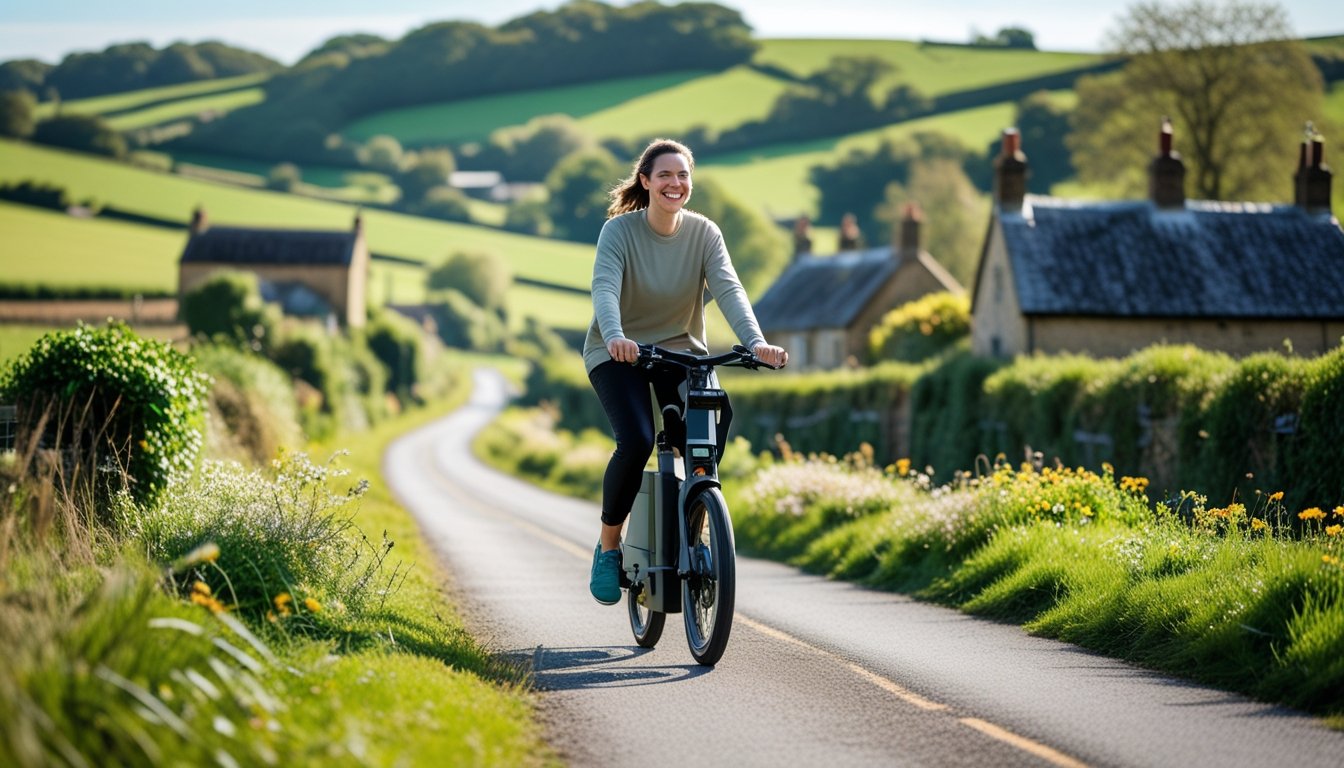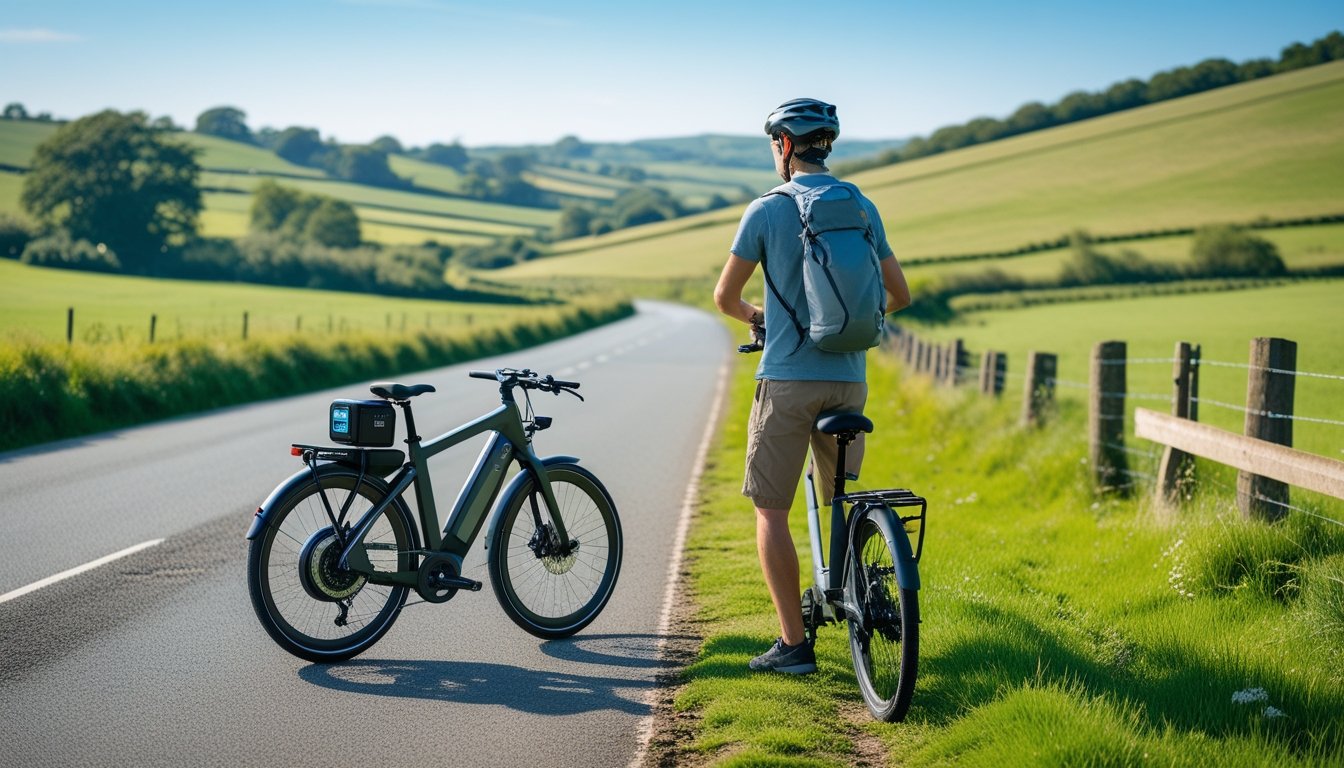Late updated: 15 Nov 2025 14:11
Written by: Oliver Bennett
Electric Bicycles: A Sustainable Commute for UK Rural Areas
Electric bicycles, or e-bikes, are emerging as a vital solution for enhancing sustainable transport across the UK, particularly in rural areas. These compact, eco-friendly vehicles offer a practical alternative for commuting where traditional public transport is less accessible, and car dependency remains high. By providing a cost-effective and efficient means of travel, e-bikes can significantly reduce carbon emissions, contributing to a healthier environment in rural communities.

E-bikes are not just about reducing emissions; they also offer economic benefits. Rural residents can save on fuel costs and vehicle maintenance by switching to electric bicycles, which can cover long distances and varied terrains with ease. Enhanced mobility and lower operational costs can improve access to jobs, education, and essential services, making them a transformative option for rural infrastructures.
As we delve into the broader impacts and practical considerations of adopting e-bikes in these regions, the potential for e-bikes to revolutionise rural transport becomes evident. Understanding the nuances of their implementation can help maximise their benefits and overcome challenges, making our rural commuting more sustainable and accessible.
Key Takeaways
- E-bikes reduce emissions and provide a sustainable commute option.
- They offer economic benefits like lower fuel and maintenance costs.
- E-bikes improve mobility and access to essential services in rural areas.
Why Electric Bicycles Enable Sustainable Commutes in UK Rural Areas
Electric bicycles offer an environmentally friendly travel option for rural communities, reducing reliance on cars and addressing unique regional challenges. Their ability to navigate diverse terrains and cover longer distances makes them ideal for countryside commutes, while also lowering carbon emissions.
Addressing Rural Transport Challenges
Rural areas in the UK often face limited public transport options, making travel challenging. Many communities are remote and spread out, which means infrequent bus services or non-existent train routes. Electric bikes provide an effective solution.
E-bikes offer flexibility and convenience. With the ability to travel directly from home to destination, electric bicycles overcome the rigidity of fixed public transport schedules. For those who live where roads are narrow or poorly maintained, electric bikes prove to be a nimble and manageable alternative to larger vehicles.
Environmental Benefits and Carbon Footprint Reduction
The ecological advantages of electric bikes are significant. Traditional transport methods in rural areas usually involve cars, which contribute heavily to carbon emissions. By contrast, e-bikes produce zero emissions during use.
This shift reduces the overall carbon footprint of commuters, moving toward a sustainable lifestyle. Electricity-powered bikes use significantly less energy than cars, ensuring that even long-distance commutes don't significantly impact the environment. Additionally, with many people now seeking to reduce their personal carbon footprint, e-bikes offer a practical means to help mitigate climate change effects.
Suitability for Varied Terrain and Long Distances
Navigating rural landscapes can be demanding. The varied topographies present challenges that conventional bikes might struggle with. Electric bicyles handle hills, valleys, and uneven paths, enhancing travel comfort and efficiency.
The pedal-assist feature of electric bikes makes climbing steep hills much easier, eradicating concerns about energy exertion. Long distances, which might otherwise be impractical for a manual cycle, become feasible without exhausting the rider. As such, electric bikes extend the accessible range for both daily commutes and occasional journeys, broadening travel opportunities for rural dwellers.
Comparing Electric Bicycles to Conventional Bikes and Cars
Compared to traditional bicycles, e-bikes offer enhanced speed and efficiency, crucial for longer rural commutes. Conventional cycles might necessitate more physical effort, making them less appealing for lengthy or uphill journeys. Electric bikes mitigate this through power-assist functions.
In comparison to cars, e-bikes offer considerable flexibility and environmental savings. While cars are necessary for certain trips, for shorter distances electric bikes provide a cost-effective and eco-friendly option. They avoid fuel costs and reduce maintenance expenses, making them accessible and sustainable.
Electric bicycles make sustainable commuting a reality for rural areas, addressing transport challenges and easing the transition to a lower carbon footprint.
Key Considerations for Rural E-Bike Adoption

Adopting e-bikes in rural UK areas involves examining various essential factors. These include developing adequate cycling infrastructure, ensuring effective battery management, and considering legal and cost-related aspects associated with e-bikes.
Cycling Infrastructure and Safe Rural Routes
To enhance e-bike adoption in rural areas, improving cycling infrastructure and creating safe routes is crucial. Many rural areas feature unpaved roads and hilly terrain, which might challenge regular cyclists. Constructing dedicated cycling lanes can make routes safer and more accessible, encouraging residents to adopt e-bikes.
Signage for these routes should be clear and informative, highlighting key information like distance, terrain difficulty, and available rest stops. Additionally, partnerships with local councils can facilitate the development of bike racks and parking areas, ensuring that there are secure options for storing e-bikes near popular destinations.
Battery Life, Charging, and Maintenance
E-bike users in rural areas must pay attention to battery life and charging facilities. The distances between destinations can be significant, necessitating a battery that lasts for extensive rides. It's critical to ensure convenient locations for charging stations throughout the countryside, ideally close to popular trails or cycle routes.
Routine maintenance is also vital. Riders should be informed about basic e-bike maintenance practices, such as checking tyre pressure and ensuring the battery is functioning optimally. Workshops or community events could be organised to educate e-bike owners on maintaining their bicycles efficiently.
Insurance, Legality, and Cost Factors
Insurance and legality are important considerations. E-bike users should be aware of the legal requirements, such as whether helmets are recommended or compulsory, and any speed limits that apply to e-bikes in rural contexts. Securing insurance coverage is advisable to protect against theft or damage.
Cost factors also play a significant role. Although e-bikes offer a cost-effective alternative to cars, initial expenses can be a barrier. Subsidised programmes or incentives by local governments could alleviate these upfront costs, making e-bikes more accessible to residents. Understanding these areas prepares us to foster a successful integration of e-bikes into rural life.
Frequently Asked Questions

We often explore the role of electric bicycles in promoting sustainable commuting in rural UK. These bikes offer environmental benefits, economic incentives, and practical efficiency for rural residents.
What are the benefits of using electric bicycles for rural commuting in the UK?
Electric bicycles are eco-friendly and reduce carbon emissions. They offer cost savings on fuel and can tackle long distances with ease. Their pedal-assist feature aids in navigating hills and rough terrains, making them suitable for rural settings.
How does the performance of electric bicycles compare to traditional bikes in rural terrains?
Performance-wise, electric bicycles surpass traditional bikes in challenging terrains. The assistance from the electric motor makes uphill rides and long trips less daunting. This aspect is particularly beneficial in the varied landscapes typical of rural UK.
What financial incentives are available for UK residents purchasing electric bicycles for rural travel?
In the UK, some government schemes encourage electric bicycle purchases through grants or subsidies. These incentives make electric bikes more accessible, easing the financial burden on potential buyers.
Can electric bicycles contribute to reducing traffic congestion in rural UK areas?
Electric bicycles can significantly reduce traffic congestion by replacing short car trips. This switch can ease road use, particularly during peak tourist seasons when vehicle numbers surge in rural areas.
What infrastructure developments are required to support the widespread use of electric bikes in the UK countryside?
To support electric bicycles, infrastructure must include designated bike lanes and safe parking. Expanding these facilities would ensure a safe and efficient cycling environment in rural regions.
How do charging facilities and range limitations affect the practicality of electric bikes for rural commutes in the UK?
Charging facilities are crucial for practicality, with more stations needed in rural areas. While most electric bikes cover significant distances on a single charge, enhancing the network of charging points ensures uninterrupted travel for rural commuters.
